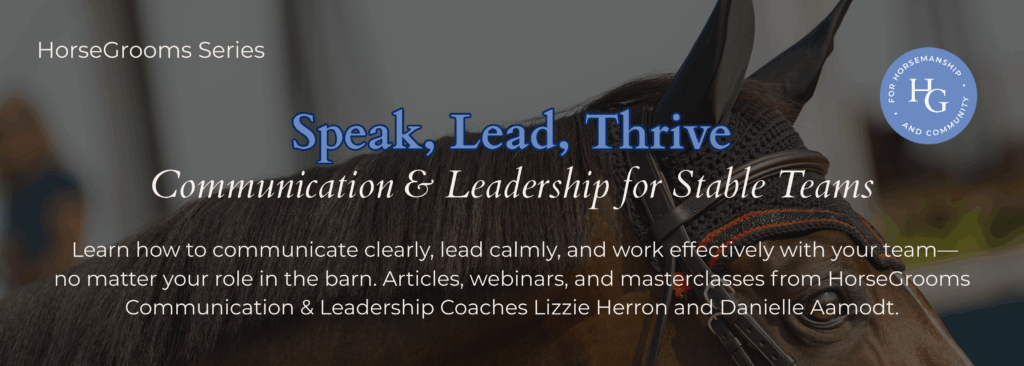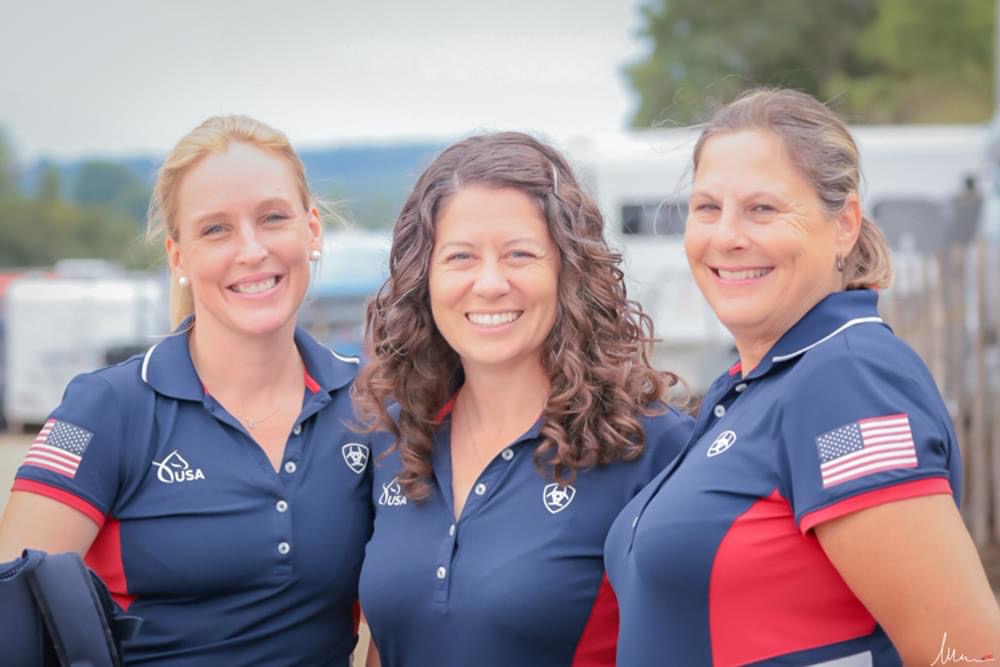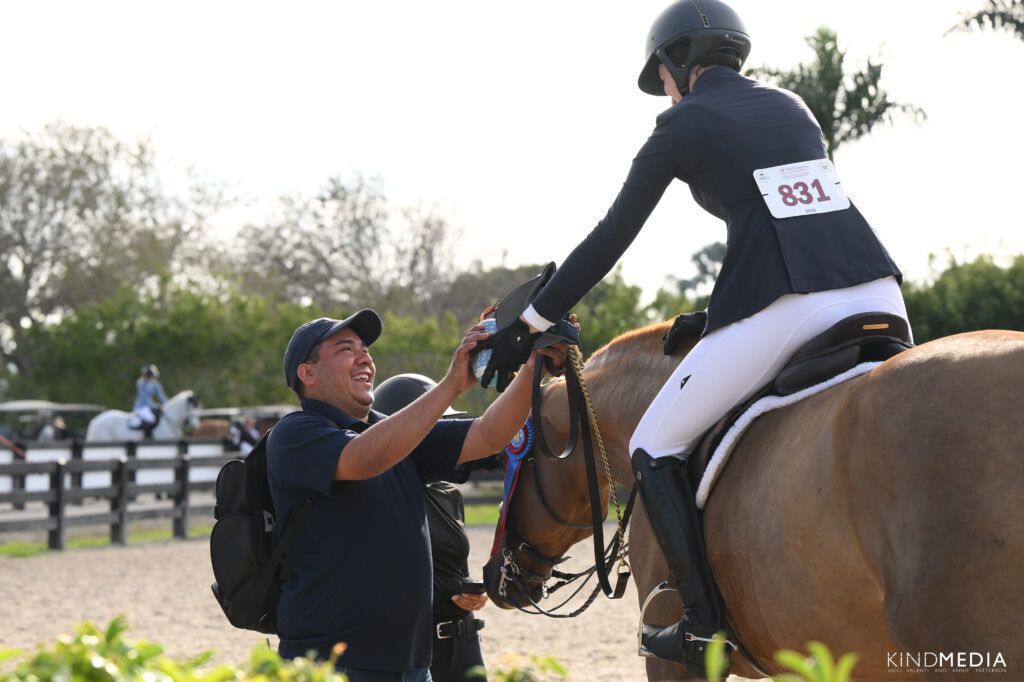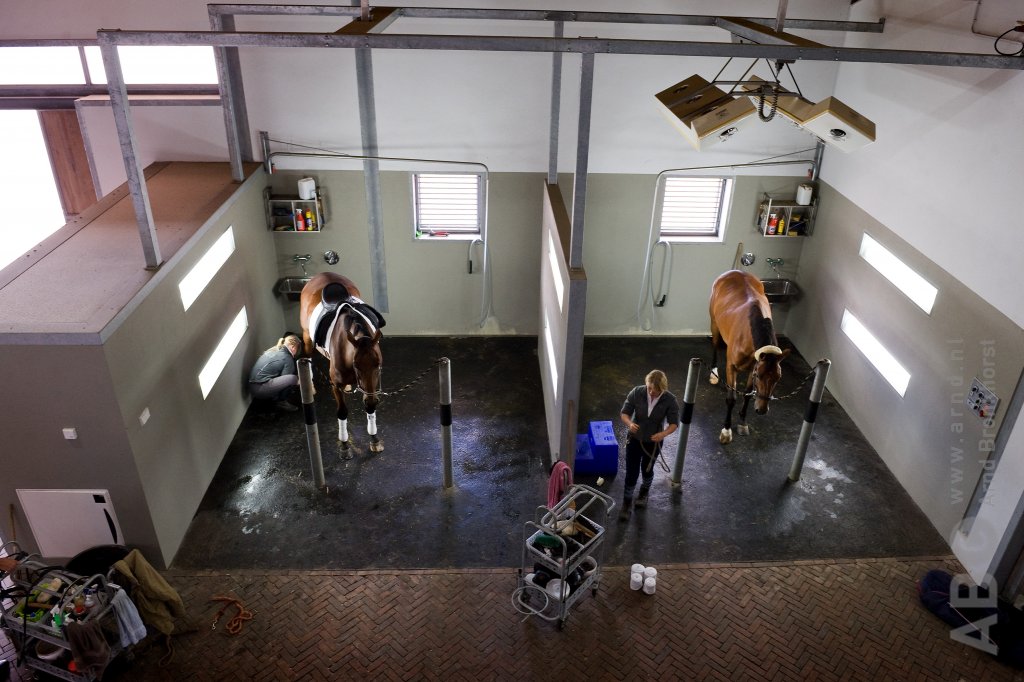
In the horse world, leadership doesn’t always come with a title. You might be the most experienced groom in the barn, but not technically the manager. Or maybe you’ve just been promoted to a lead role and feel fine about managing the horses, but unprepared to manage the people.
Whether you’re leading without actual authority or learning how to manage your peers, one thing is certain: the horses aren’t the only ones who need your attention. Your ability to lead people—calmly, clearly, and confidently—can make or break the health of your team and the wellbeing of the animals in your care.
Here are four concepts to guide your leadership journey in the barn—even if you’re just figuring it out as you go.
1. Leadership Isn’t a Title—It’s How You Show Up
This is the best kept secret about leadership: you don’t need to be “in charge” to lead. In fact, some of the best leaders in barns are the ones who lead quietly by example.
Leadership is about influence—how your behavior, work ethic, and attitude affect the people around you. It shows up in the way you handle pressure, how you treat the horses, and how you talk about coworkers on a long day when nothing is going right.
The catch is that you may be leading without even knowing it.
How can you tell? If others naturally come to you with questions, if they copy how you do things, or if they follow your example in tough situations—you’re already leading. So let’s hope you are representing yourself in the right ways!
Here’s how to lead from the aisleway, even without a formal title:
- BE RELIABLE. Show up on time, prepared, and ready to work.
- STAY CALM when things get stressful. Horses—and people—need steady energy.
- HELP OTHERS SUCCEED. Share what you know without making others feel small.
- TAKE PRIDE IN THE DETAILS. The way you clean a stall, wrap a leg, or treat a horse’s sore back teaches more than you think.
When you lead with consistency and calm, you earn respect—not because of your title, but because of your presence. Even if this doesn’t get you the immediate promotion, it will always serve you well in your career.

2. Protect Your Future Opportunities—Don’t Get Pulled into the Drama
In barns, drama spreads faster than horses noticing the feed cart. Gossip, cliques, complaining, and “taking sides” might feel like bonding in the moment, but they will destroy trust—and likely your chances of future promotions.
Owners, managers, and clients notice who keeps their head down, stays professional, and focuses on solutions. They also notice who fuels conflict or talks badly about others. (Hopefully the manager isn’t part of the problem, but even if they are–this advice is even more important!)
If you want to move up someday, your reputation is your ticket. Protect it.
Here’s how to rise above the muck:
- DON’T GOSSIP—EVER. If it’s not about horse care or barn operations, it doesn’t need to be discussed.
- STAY NEUTRAL during conflicts. Focus on the work and your values, not the politics.
- KEEP YOUR COOL, no matter what. Emotional blow-ups can stick in people’s minds longer than your best day’s work.
- SPEAK UP if something’s unsafe or unethical—but do it respectfully, through the right channels, and at the right time.
Think long-term: every interaction is a chance to show you’re ready for more responsibility. Don’t let momentary frustration close a door you haven’t even knocked on yet. This can be a lot easier said than done, so remind yourself that it’s worth it!
3. You Don’t Just Find Great Teammates—You Help Build Them
Whether you’re the official team leader or just someone others look up to, one of the most powerful things you can do is help others grow. You can do this whether or not you are in charge.
That doesn’t mean doing everything yourself so it’s “done right.” It means taking time to show someone how to do a standing wrap, or walking a newer groom through how to read a horse’s temperature or recognize colic signs.
Great teams are built, not hired. And your influence can shape how someone develops their skills, their confidence, and their work ethic.
Here’s how to develop strong teammates:
- NOTICE STRENGTHS. Give someone a task they’re naturally good at and build from there. It’s not that different from training a sensitive horse.
- SET MINI-GOALS. Encourage a team effort, like “Let’s all get tacked and ready 15 minutes earlier this week.” Then set everyone up for success.
- OFFER REAL PRAISE. Don’t just say “good job”—say why it was good. Truly seeing another person’s effort goes a long way.
- MAKE ROOM FOR MISTAKES. Remember that we all started somewhere. Teach and correct without shame.
Helping others grow doesn’t take away from your own success—it amplifies it. A strong team makes your day easier, the horses safer, and the barn run smoother. Be competitive against who you were yesterday, not against your team.
4. Even in Leadership, You’re Still Part of the Team
One of the hardest parts about stepping into a leadership role is realizing your role has changed—but your relationships haven’t quite caught up.
You might feel caught between being “one of the crew” and trying to set higher standards. You might wonder: Can I still joke around with everyone? Will they think I’m bossy if I speak up?
Here’s the truth: leadership isn’t about separating yourself from the group. It’s about helping the group work better. That means you’re still part of the team—just with a little more responsibility and a wider view.

Here’s how to lead with your team, not over them:
- BE APPROACHABLE, but clear. Don’t let things slide just to avoid awkwardness.
- SHARE CREDIT. When things go well, highlight team effort—not just your own role.
- DO YOUR PART. Don’t delegate every hard task. Show that you’re still willing to work.
- STAY HUMBLE. If you mess up, own it. If you need help, ask for it.
Leading doesn’t mean having all the answers. It means keeping everyone moving in the same direction—and making sure no one gets left behind.
Final Thought: Lead How You Work—With Intention and Care
Whether you’re leading with or without a title, your ability to support others, stay grounded, and build a great team will shape your barn’s success more than any job description. Whether or not bosses can understand exactly ‘why’ a team is great, they will definitely notice. That’s how you elevate your career and your barn.
Remember, leadership is a responsibility, not a privilege. It’s not about holding a position of power, but about serving the needs of the team so they can thrive.
Horses thrive in calm, consistent environments. People do, too. Lead by example. Speak with clarity. Lift others up. That’s how great leaders—and great barns—are built.
NOTE FROM THE HORSEGROOMS TEAM
This conversation is part of a bigger picture. Following Susanna Ole’s recent global study of over 1,300 grooms, and our in-depth webinar with her, one truth stands out: the equestrian industry can’t thrive unless its people, including grooms, are supported.
In our recent article for employers, we offer practical ways barn owners, riders, and trainers can help create healthier, more sustainable workplaces. Because when grooms feel heard and respected, horses benefit, and so does the entire team. We encourage you to read it and maybe even find a way to show it to your boss.


